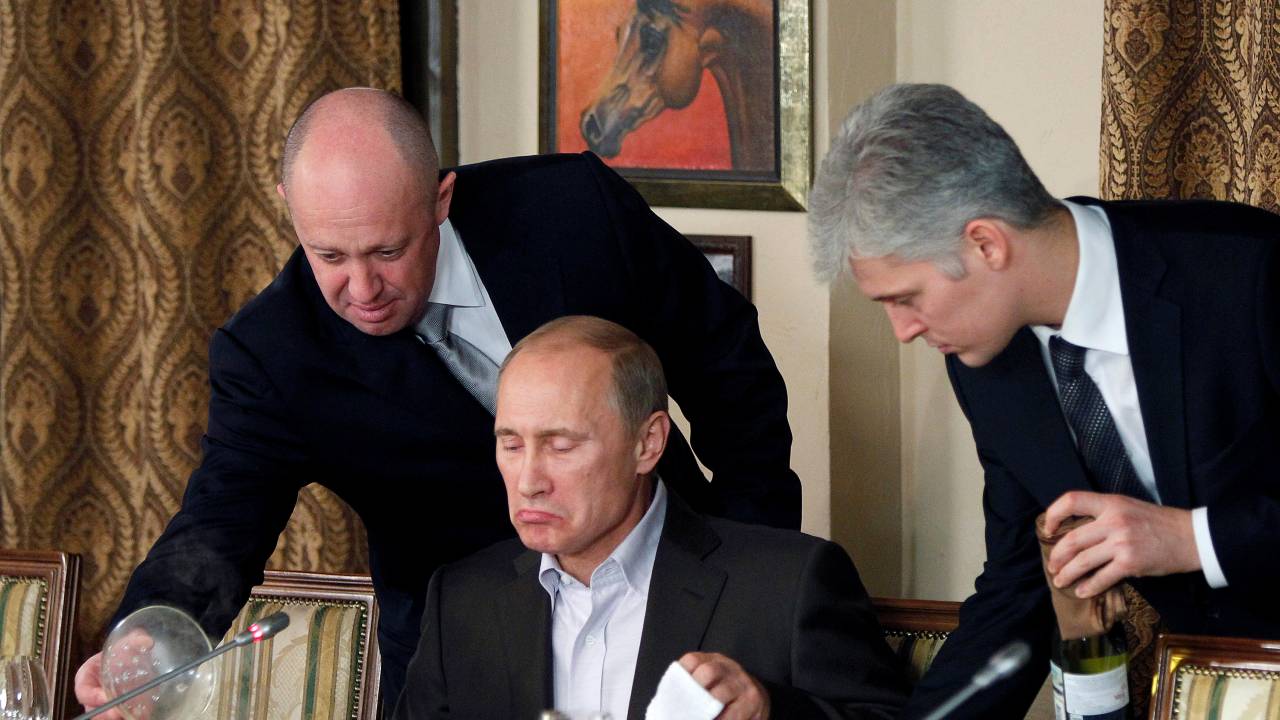As a result of its ever-expanding Belt and Road Initiative, China’s influence in Africa has received a great deal of attention. But Russia too has been expanding its operations across the continent in recent years. The signs are clear — in 2019, the Kremlin organized the inaugural Russia-Africa Summit in Sochi, which resulted in Moscow approving military-technical cooperation agreements with more than 30 African countries, along with pledges of economic cooperation. President Vladimir Putin, who has said Russian foreign policy attaches great importance to Africa, also approved plans to help develop the continent’s energy sector.
That is the official story, but below the policy waterline, something less visible is happening. There are a number of unofficial operations working alongside diplomatic channels to advance the interests of Putin and his inner circle. The man most closely associated with these campaigns is Yevgeny Prigozhin, the so-called Kremlin chef, an old associate of Putin’s who holds a prominent position on the FBI’s most-wanted list for funding the Internet Research Agency’s efforts to subvert the 2016 presidential election. Prigozhin has also been sanctioned by the U.S. and allied governments for financing the Wagner Group, a private military company described by the U.S. as a “Russian Ministry of Defense proxy force.”
Over the years, Wagner forces have been deployed in conflict zones in both Ukraine and Syria—in the latter, Wagner’s units were severely mauled by U.S. forces in a 2018 confrontation in Deir al-Zour. More recently, however, Africa has provided a fertile — and less contested — market for the company’s private mercenaries.
Wagner mercenaries often work in tandem with Prigozhin’s other businesses, many focused on natural resource extraction. The proliferation of his African network has come to represent a broader trend in Russian foreign policy — one that is geared towards assisting authoritarian regimes while opening up opportunities to evade Western sanctions. This is most evident in the Central African Republic (CAR).
In 2018, Central African Republican President Faustin-Archange Touadéra appointed Valeriy Zakharov, a former Russian intelligence operative and known associate of Prigozhin, as his national security adviser. With its abundant reserves of gold, diamonds, oil and uranium, the country presents lucrative opportunities for resource extraction. Three companies affiliated with Prigozhin — Sewa Security Services, Lobaye Invest and M Finans — now engage in a range of business activities throughout the country. According to the U.S. Treasury Department, Lobaye Invest and M Finans specialize in gold and diamond mining. Both were sanctioned last year by the United States for their ties to Prigozhin.
Hundreds of Russian mercenaries are said to be based in the CAR, where they have been accused of extensive brutality against local people. United Nations human rights investigators recently expressed serious concerns over these actions and the “interconnected roles” of Sewa Security Services, Lobaye Invest, and Wagner Group.
The spread of Prigozhin’s network is generally unseen, but occasionally it emerges into a hostile light. In 2018, three Russian journalists were murdered while in the CAR to investigate Prigozhin’s shady business deals. A subsequent investigation by the Dossier Center was able to link Prigozhin and three of his associates — Valeriy Zakharov, Kirill Romanovsky, and Mikhail Burchik — to a plan to ambush the journalists. While there was no direct accusation against Prigozhin, the report noted that he “exercises systemic control over the operations of the company.”
Wagner has not limited itself to central Africa. In 2019, its forces were active in the failed attempt to preserve former Sudanese President Omar al-Bashir’s 26-year-long grip on power. Before his ousting, Bashir had given Prigozhin’s company, M Invest, preferential access to Sudan’s gold reserves and had even agreed to allow Russia to build a naval base on the country’s Red Coast — a move that was finalized last December.
Wagner forces are also currently operating alongside the official Russian military in Libya, where they have intervened in support of renegade General Khalifa Haftar. Moscow has equipped Wagner personnel in Libya with armored vehicles and air defense systems, and last year provided four Mig-29 and Su-24 combat aircraft with their Russian markings painted over. The Kremlin’s intervention may soon open the door to lucrative defense contracts, as well as access to military bases along NATO’s southern flank. The British government has sanctioned Prigozhin for his Libyan activities, saying he is, “responsible for significant foreign mercenary activity in Libya and multiple breaches of the UN arms embargo.”
Prigozhin recently expanded his interests to Madagascar, where his associates gave bribes and told lies to undermine and divide opposition parties leading up to the country’s 2019 presidential election. The Russians arrived soon after a meeting involving the country’s president, Hery Rajaonarimampianina, Putin, and Prigozhin. In the run-up to the polls, dozens of Russian political operatives arrived on the island. Around this time, Prigozhin purchased a major stake in a Madagascan government-run company that mines chromium, a mineral used in stainless steel.
The political operatives deployed to Madagascar were from the Association for Free Research And International Cooperation (AFRIC), another one of Prigozhin’s corporate offshoots. The disinformation company is run from Prigozhin’s command center back in St. Petersburg, unofficially known as the “Africa back office.”
These tactics, which continue to spread across Africa, illustrate how Putin and his associates profit off of some of the continent’s most lucrative natural resources while simultaneously evading Western sanctions. According to OFAC, Prigozhin’s businesses in Africa have directly “enabled his ability to evade U.S. sanctions.”
While the United States has already sanctioned Prigozhin, Burchik, AFRIC, and others, several key Russians involved in these operations have so far escaped designations. The United States, along with the rest of the transatlantic community, should consider expanding sanctions to include all individuals and entities responsible in the Kremlin’s shadow operations. In the absence of a strong, coordinated multilateral response against this broader network, Prigozhin’s ability to act and to evade sanctions will continue unabated.




